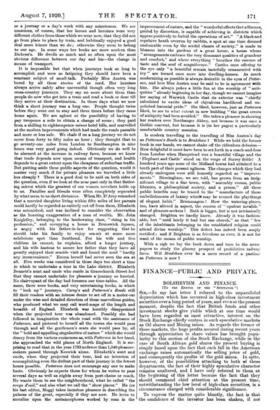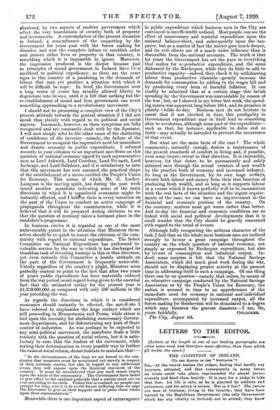FINANCE-PUBLIC AND PRIVATE.
BOLSHEVISM AND FINANCE.
[To THE EDITOR or TEE SPECTATOR."] Sur,—In my last letter I referred to the unparalleled depreciation which has occurred in high-class investment securities over a long period of years, and even at the present moment, despite the fact that British funds and other investment stocks give yields which at one time would have been regarded as most attractive, interest on the Stock Exchange chiefly centres in such speculative markets as Oil shares and Mining issues. As regards the former of these markets, the huge profits secured during recent years through appreciation in share values has brought popu- larity to this section of the Stock Exchange, while in the case of South African gold shares the present buying is simply based upon the fact that each fall in the American exchange raises automatically the selling price of gold, and consequently the profits of the gold mines. In spite, however, of the possibilities attaching to both of these departments, the fact of their highly speculative character remains unaltered, and I have only referred to them at the beginning of this letter because the fact that they should command chief attention at the present time, notwithstanding the low level of high-class securities, is a circumstance charged with considerable significance.
To express the matter quite bluntly, the fact is that the confidence of the investor has been shaken, if not shattered, by two aspects of modern government which affect the very foundations of security both of property and investments. A contemplation of the present situation in Ireland, a remembrance of the coquetting by the Government for years past with the forces making for disorder, and now the complete failure to establish order and protect either lives or property in that country, is something which it is impossible to ignore. Moreover, the impression produced is the deeper because just as principles of sound government in Ireland have ben sacrificed to political expediency, so there are the same signs in this country of a pandering to the demands of labour that may yet produce a situation with which it will be difficult to- cope. In brief, the Government over a long series of years has steadily allowed liberty to degenerate into licence, until it is felt that nothing but the re-establishment of sound and firm government can avert something approaching to a revolutionary movement.
I should not be presenting a complete view of the City's present attitude towards the general situation if I did not speak thus plainly with regard to its political and social aspects. Inasmuch, however, as these symptoms are fully recognized and are constantly dealt with by the Spectator, I will now simply refer to the other cause of the shattering of confidence of the investor—namely, the failure of the Government to recognize the imperative need for immediate and drastic economy in public expenditure. I referred recently in your columns to an important manifesto on this question of national economy signed by such representative men as Lord Ask-with, Lord Cowdray, Lord MI mott, Lord Inchcape, and Lord Salisbury, and it is satisfactory to note that this movement has now assumed the practical shape of the establishment of a union entitled the People's Union for Economy. This union, of which Mr. G. Locker- Lampson is the moving spirit, has during the past week issued another manifesto indicating some of the main directions in which it is considered economies might be instantly effected, and I believe there is every intention on the part of the Union to conduct an active campaign of propaganda throughout the constituencies, while it is believed that it will be prepared during elections to see that the question of economy takes a foremost place in the candidate's programme.
In business circles it is regarded as one of the most unfavourable points in the situation that Ministers them- selves should be so quick to resent the criticism of the com- munity with regard to national expenditure. The Select Committee on National Expenditure has performed in- valuable service by the way in which it has discharged its thankless task of revealing wastage in this or that direction, yet even towards this Committee a hostile attitude on the part of the Government is frequently noticeable Utterly regardless of the country's plight, Ministers seem perfectly content to point to the fact that after two years of peace public expenditure has been materially reduced from the war period, scant regard being given to the essential fact that the estimated outlay for the present year is £1,2t0,000,000, as compared with only 200 millions in the year preceding the war.
As regards the directions in which it is considered economies ahould instantly be effected, the manifesto I have referred to emphasizes the huge outlays which are still proceeding in Mesopotamia and Persia, while stress is laid upon the necessity for abolishing unnecessary Govern- ment departments, and for difecontinuing any kind of State control of industries. As was perhaps to be expected in any semi-political movement, the manifesto deals a little tenderly with the question of social reform, but it is satis- factory to note that the leaders of the movement, while stating their determination in every possible way to further the cause of social reform, do not hesitate to maintain that :— " In the circumstances of the time we are forced to the con- clusion that measures must be scrutinised not merely in respect of their intrinsic merits, but also in regard to any additional strain they will impose upon the financial resources of the country. It must be remembered that any such strain reacts upon the whole of the community. The Government have failed to give effect to the cardinal principle that a nation must cut its coat according to its cloth. Unless this is realized, no people can prosper for long, and it is to avoid future suffering that we urge the Electorate to give us their support and to press these views upon their representatives."
Meanwhile there is one important aspect of extravagance in public expenditure which business men in the City are convinced is insufficiently noticed. Most people can see the effect of unnecessary and wasteful expenditure upon the national balance-sheet, and subsequently upon the tax- payer, but as a matter of fact the matter goes much deeper, and its evil effects are of a much wider influence than is discernible from the national accounts. The truth is that for years the Government has set the pace in everything that makes for uNproductive expenditure, and the sums disbursed by the Exchequer, while they do little to add to productive capacity—indeed, they check it by withdrawing labour from productive channels—greatly increase the demands for consumption by adding to the wages bill and by producing every form of harmful inflation. It can readily be admitted that at a certain stage this lavish spending by the Government was unavoidable by reason of the war ; but, as I showed in my letter last week, the spend- ing mania was apparent long before 1914, and its presence is plainly visible to-day. Business men do not hesitate to assert that if not checked in time, this prodigality in Government expenditure may in itself lead to something akin to revolution, although some part of the expenditure— such as that, for instance, applicable to doles and so forth—may actually be intended to prevent the occurrence of that event.
But what are the main facts of the case ? The whole community, naturally enough, desires a maintenance of the present standards of comfort in living and, if possible, even some improvement in that direction. It is impossible, however, for that desire to be permanently and safely attained save through the actual creation of new wealth by the practice both of economy and increased industry. So long as the Government, by its own huge outlays, diverts both labour and money from their true function of producing fresh wealth, and so long as it supports labour in a course which it knows perfectly well to be inconsistent with the real facts of the situation and the urgent require- ments of the case, we can have no improvement in the financial and economic position of the country. On the contrary, m,atters must get worse rather than better. And to-day the financial and economic conditions are so linked with social and political developments that it is small wonder that the City should be gravely concerned with regard to the trend of events.
Although fully recognizing the arduous character of the task, I find that on the whole most business men are inclined strongly to favour a great campaign throughout the country on the whole question of national economy, not simply as expressed by Exchequer expenditure, but also by means of consumption and industrial output. In- deed, some surprise is felt that the National Savings Association, which did much good work during the war, should not be displaying greater activity at the present time in addressing itself to such a campaign. Of one thing there can be no question—namely, that unless, by means of an educative campaign conducted by the National Savings Association or by the People's Union for Economy, the nation is aroused in time to an apprehension of the immediate need for economy in national and individual expenditure, accompanied by increased output, all the forces making for Bolshevism will be stimulated to a degree which may threaten the gravest disasters.-1 am, Sir,



































 Previous page
Previous page